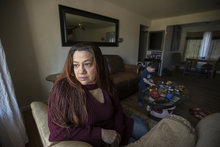0
News Article
Community:
Apr 25, 2019
The Cook County Board on Thursday passed limits on the practice of asking potential tenants about their criminal histories, despite pleas to hold off until landlords and property owners had a chance to air their concerns.
Authored by: Rachel Hinton for Chicago Sun Times
Topics: Criminal justice, Housing, Legislation & Policy, Racial inequalities
 Shared by Housing Is
Shared by Housing Is
Housing Is posted a
on May 2, 2019
Rachel Hinton for Chicago Sun Times
The Cook County Board on Thursday passed limits on the practice of asking potential tenants about their criminal histories, despite pleas to hold off until landlords and property owners had a chance to air their concerns.
0
Interactive
Community:
NHC’s annual release of Paycheck to Paycheck provides insights into the ability of working households to afford typical housing in metropolitan areas across the country. The published report highlights the housing affordability challenges of workers within the construction industry across 259 metropolitan areas. See our methodology for more information on how we come up with our numbers (or use the same methodology to do your own analysis).
Authored by: National Housing Conference
Topics: Homelessness, Housing, Legislation & Policy, Low-income
 Shared by Housing Is
Shared by Housing Is
Housing Is posted a
on May 1, 2019
National Housing Conference
NHC’s annual release of Paycheck to Paycheck provides insights into the ability of working households to afford typical housing in metropolitan areas across the country.
0
Publication
Community:
Moving Health Care Upstream (MHCU) is based on the belief that health systems can address persistent and costly health inequities by moving “upstream”—beyond the walls of hospitals and clinics and into the communities, collaborating with community-based organizations to address the root causes of disease. The various areas of work within MHCU share a common focus-supporting hospitals and community stakeholders in testing and spreading strategies to move upstream, and sharing “what works” to inform the field and accelerate the upstream movement in the field as a whole. Policy Learning Labs are one example of MHCU’s work to spread knowledge and accelerate action in the field.
Authored by: Nemours, Moving Health Care Upstream, and Change Lab Solutions
Topics: Child welfare, Early childhood, Food insecurity, Green, Health, Housing, Legislation & Policy, Nutrition, Partnerships, Youth
 Shared by Housing Is
Shared by Housing Is
Housing Is posted a
on May 1, 2019
Nemours, Moving Health Care Upstream, and Change Lab Solutions
Moving Health Care Upstream (MHCU) is based on the belief that health systems can address persistent and costly health inequities by moving “upstream”—beyond the walls of hospitals and clinics and into the communities, collaborating with community-based organizations to address the root causes of di
0
Policy Brief
Community:
Congress has an important opportunity in 2019 to improve the health of millions of our nation’s children by passing a strong reauthorization that protects and strengthens the child nutrition programs. These successful, cost-effective federal nutrition programs play a critical role in helping children in low-income families achieve access to child care, educational, and enrichment activities while improving overall nutrition, health, development, and academic achievement.
Authored by: Feeding America and Food Research & Action Center
Topics: Child welfare, Early childhood, Food insecurity, Funding, Legislation & Policy, Low-income, Nutrition
 Shared by Housing Is
Shared by Housing Is
Housing Is posted a
on May 1, 2019
Feeding America and Food Research & Action Center
Congress has an important opportunity in 2019 to improve the health of millions of our nation’s children by passing a strong reauthorization that protects and strengthens the child nutrition programs.
0
Report
Community:
As the United States rapidly becomes both a more diverse and unequal nation, policymakers face the urgent challenge of confronting growing wealth gaps by race and ethnicity. To create a more equitable and secure future, we must shift away from public policies that fuel and exacerbate racial disparities in wealth. But which policies can truly begin to reduce our country’s expanding racial divergences?
Authored by: Demos and The Institute on Assets and Social Policy (IASP)
Topics: Housing, Legislation & Policy, Racial inequalities, Research
 Shared by Housing Is
Shared by Housing Is
Housing Is posted a
on Apr 26, 2019
Demos and The Institute on Assets and Social Policy (IASP)
As the United States rapidly becomes both a more diverse and unequal nation, policymakers face the urgent challenge of confronting growing wealth gaps by race and ethnicity.
0
Publication
Community:
Apr 11, 2019
Consistent with Executive Order 13853, “Establishing the White House Opportunity and Revitalization Council,” this document informs the public that HUD intends to maximize the beneficial impact of investment in Opportunity Zones. HUD is reviewing its existing policies, practices, planned actions, regulations, and guidance regarding HUD-administered programs and laws to identify actions HUD can take to encourage beneficial investment, both public and private, in urban and economically distressed communities, including qualified Opportunity Zones. HUD seeks input and recommendations from the public regarding potential agency actions.
Authored by: Department of Housing and Urban Development (HUD)
Topics: Community development, Legislation & Policy
 Shared by Housing Is
Shared by Housing Is
Housing Is posted a
on Apr 23, 2019
Department of Housing and Urban Development (HUD)
Consistent with Executive Order 13853, “Establishing the White House Opportunity and Revitalization Council,” this document informs the public that HUD intends to maximize the beneficial impact of investment in Opportunity Zones.
0
Research
Community:
Apr 16, 2019
This report presents a case study of the Chicago Housing Authority’s (CHA’s) work requirement policy, one of a small number of work requirements implemented by housing authorities. The report describes the CHA work requirement, the policy’s implementation and how it has changed, and perceptions of implementation and outcomes from key CHA and service provider staff and residents. The CHA work requirement has been in place for nearly 10 years, allowing us to analyze implementation over time and outcomes.
Authored by: Diane K. Levy, Leiha Edmonds, Samantha Batko, and Marcus Gaddy for The Urban Institute
Topics: Asset building, Legislation & Policy, Low-income, Midwest, Research
 Shared by Housing Is
Shared by Housing Is
Housing Is posted a
on Apr 23, 2019
Diane K. Levy, Leiha Edmonds, Samantha Batko, and Marcus Gaddy for The Urban Institute
This report presents a case study of the Chicago Housing Authority’s (CHA’s) work requirement policy, one of a small number of work requirements implemented by housing authorities.
0
News Article
Community:
Apr 9, 2019
Until recently, efforts to improve the health of Americans have focused on expanding access to quality medical care. Yet there is a growing recognition that medical care alone cannot address what actually makes us sick. Increasing health care costs and worsening life expectancy are the results of a frayed social safety net, economic and housing instability, racism and other forms of discrimination, educational disparities, inadequate nutrition, and risks within the physical environment. These factors affect our health long before the health care system ever gets involved.
Authored by: Brian Castrucci and John Auerbach for Shelter Force
Topics: Food insecurity, Health, Housing, Legislation & Policy, Transportation
 Shared by Housing Is
Shared by Housing Is
Housing Is posted a
on Apr 23, 2019
Brian Castrucci and John Auerbach for Shelter Force
Until recently, efforts to improve the health of Americans have focused on expanding access to quality medical care. Yet there is a growing recognition that medical care alone cannot address what actually makes us sick.
0
News Article
Community:
Apr 17, 2019
While Congress has both the power and the duty to forestall the loss of this important resource, its actions to date only hasten the deterioration and demolition of public housing.
Authored by: Timothy Kaiser for the Orlando Sentinel
Topics: Funding, Housing, Legislation & Policy
 Shared by Housing Is
Shared by Housing Is
Housing Is posted a
on Apr 19, 2019
Timothy Kaiser for the Orlando Sentinel
While Congress has both the power and the duty to forestall the loss of this important resource, its actions to date only hasten the deterioration and demolition of public housing.
0
News Article
Community:
Apr 17, 2019
The Trump administration proposed a rule on Wednesday night intended to prevent undocumented immigrants from receiving federal housing assistance, the latest step in its efforts to ramp up enforcement of the nation’s immigration laws.
Authored by: Annie Karni and Michael D. Shear for The New York Times
Topics: Housing, Immigrants, Legislation & Policy
 Shared by Mica O'Brien
Shared by Mica O'Brien
Mica O'Brien posted a
on Apr 18, 2019
Annie Karni and Michael D. Shear for The New York Times
The Trump administration proposed a rule on Wednesday night intended to prevent undocumented immigrants from receiving federal housing assistance, the latest step in its efforts to ramp up enforcement of the nation’s immigration laws.
0
Publication
Community:
Housing and land use policies have a significant effect on schools, and since these policies are usually decided at the state and local level, educators and education advocates have the opportunity to play a significant role. Housing and land use policies can affect enrollment trends, concentrations of poverty and school diversity, school funding, stability of enrollment vs. “churning” of students, and ability of students to complete their homework and focus during the school day.
Authored by: National Education Association and the Poverty and Race Research Action Council
Topics: Child welfare, Education, Housing, Legislation & Policy
 Shared by Mica O'Brien
Shared by Mica O'Brien
Mica O'Brien posted a
on Apr 18, 2019
National Education Association and the Poverty and Race Research Action Council
Housing and land use policies have a significant effect on schools, and since these policies are usually decided at the state and local level, educators and education advocates have the opportunity to play a significant role.
0
News Article
Community:
Apr 15, 2019
Rapid re-housing was designed for people experiencing homelessness who have a good chance of paying for their own housing after a one-time boost. The Los Angeles Homeless Services Authority, which manages Measure H spending, is using the program to house a much wider segment of the homeless population.
Authored by: Madeleine Brand for KCRW
Topics: Funding, Homelessness, Housing, Legislation & Policy, Low-income, West Coast
 Shared by Mica O'Brien
Shared by Mica O'Brien
Mica O'Brien posted a
on Apr 18, 2019
Rapid re-housing was designed for people experiencing homelessness who have a good chance of paying for their own housing after a one-time boost.
1
Publication
Community:
Apr 8, 2019
In 2015, the Supplemental Nutrition Assistance Program (SNAP) prevented 8.4 million people from living in poverty. This essential and effective safety net program helps people with low incomes purchase food for themselves and their families—an estimated 40.8 million Americans were living in poverty in 2015; absent SNAP benefits, that number would have been 49.1 million. Despite its success, SNAP is facing rule changes that would cause people to lose benefits—harming those who need it most and weakening the poverty-fighting power of the program.
Authored by: Anthony Barrows for Ideas 42
Topics: Food insecurity, Health, Legislation & Policy, Low-income, Nutrition
 Shared by Mica O'Brien
Shared by Mica O'Brien
Mica O'Brien posted a
on Apr 18, 2019
Anthony Barrows for Ideas 42
In 2015, the Supplemental Nutrition Assistance Program (SNAP) prevented 8.4 million people from living in poverty.
0
News Article
Community:
Mar 13, 2019
Lawmakers are currently considering legislation meant to put some extra cash in the pockets of families like Franson’s. House Bill 1527 and its companion, Senate Bill 5810, would create the Working Families Tax Credit, which supporters say would make Washington’s tax code less regressive while helping households with the rising cost of living. The federal government and other states have similar programs and use rely on income tax returns to distribute credits. Washington has no income tax. If the bill passes, people would apply through the state Employment Security Department, which would determine eligibility and calculate and write checks to those eligible.
Authored by: Jake Thomas for The Columbian
Topics: Asset building, Funding, Legislation & Policy, Low-income
 Shared by Housing Is
Shared by Housing Is
Housing Is posted a
on Apr 18, 2019
Jake Thomas for The Columbian
Lawmakers are currently considering legislation meant to put some extra cash in the pockets of families like Franson’s.
0
Video
Community:
Apr 9, 2019
Examine the forgotten history of how our federal, state and local governments unconstitutionally segregated every major metropolitan area in America through law and policy.
Authored by: Mark Lopez and Richard Rothstein for Silkworm Design
Topics: Education, Housing, Legislation & Policy, Racial inequalities
 Shared by Housing Is
Shared by Housing Is
Housing Is posted a
on Apr 16, 2019
Mark Lopez and Richard Rothstein for Silkworm Design
Examine the forgotten history of how our federal, state and local governments unconstitutionally segregated every major metropolitan area in America through law and policy.
0
News Article
Community:
Apr 7, 2019
Puerto Rico was in financial distress and had crumbling infrastructure before Hurricane Maria, and many residents complain of government malfeasance that exacerbated the storm’s impact, echoing criticism from Washington. But Puerto Rican leaders say the delay to the Vieques hospital and thousands of other stalled projects is a reflection of unequal treatment from the White House and Congress, which last week failed to pass disaster relief legislation because of a dispute over how much money to send the island.
Authored by: Patricia Mazzei for The New York Times
Topics: Community development, Food insecurity, Funding, Legislation & Policy, Low-income, Nutrition, U.S. Territories
 Shared by Housing Is
Shared by Housing Is
Housing Is posted a
on Apr 15, 2019
Patricia Mazzei for The New York Times
Puerto Rico was in financial distress and had crumbling infrastructure before Hurricane Maria, and many residents complain of government malfeasance that exacerbated the storm’s impact, echoing criticism from Washington.
0
Video
Community:
Apr 9, 2019
Recording of U.S. House Financial Services Committee (Subcommittee on Consumer Protection and Financial Institutions) hearing
Authored by: U.S. House Committee on Financial Services
Topics: Housing, Legislation & Policy, Racial inequalities
 Shared by Housing Is
Shared by Housing Is
Housing Is posted a
on Apr 15, 2019
U.S. House Committee on Financial Services
Recording of U.S. House Financial Services Committee (Subcommittee on Consumer Protection and Financial Institutions) hearing
0
Report
Community:
Jan 31, 2019
The EMPOWERED study, conducted on behalf of the Assistant Secretary for Planning and Evaluation (ASPE) at the U.S. Department of Health and Human Services, examines the use of performance measures, work requirements and child support cooperation requirements across human services programs. This issue brief is based on three case studies and provides local perspectives on the challenges and opportunities for aligning performance indicators across a variety of federal programs promoting self-sufficiency.
Authored by: Elizabeth Brown, Kara Conroy, and Gretchen Kirby for Mathematica
Topics: Legislation & Policy, Metrics, Research
 Shared by Housing Is
Shared by Housing Is
Housing Is posted a
on Apr 15, 2019
Elizabeth Brown, Kara Conroy, and Gretchen Kirby for Mathematica
The EMPOWERED study, conducted on behalf of the Assistant Secretary for Planning and Evaluation (ASPE) at the U.S. Department of Health and Human Services, examines the use of performance measures, work requirements and child support cooperation requirements across human services programs.
0
Publication
Community:
To better align families’ child welfare and supportive housing needs, child welfare leaders must clearly present their vision for the role of supportive housing as a part of positive child welfare outcomes. State administrators and leaders must consider critical aspects of housing within the Family First IV-E Prevention Program Five-Year State Plan (State Plan) and introduce necessary state policy, legislative, and budgetary changes to ensure that stable, supportive housing is central to long-term family stability and well-being
Authored by: CSH
Topics: Child welfare, Family engagement, Housing, Legislation & Policy, Supportive housing
 Shared by Housing Is
Shared by Housing Is
Housing Is posted a
on Apr 12, 2019
To better align families’ child welfare and supportive housing needs, child welfare leaders must clearly present their vision for the role of supportive housing as a part of positive child welfare outcomes.
0
Publication
Community:
Could Housing Solutions be Funded by Avoidance of Excess Shelter, Hospital, and Nursing Home Costs?
Authored by: Actionable Intelligence for Social Policy
Topics: Cost effectiveness, Health, Homelessness, Housing, Legislation & Policy, Research, Seniors
 Shared by Housing Is
Shared by Housing Is
Housing Is posted a
on Apr 11, 2019
Actionable Intelligence for Social Policy
Could Housing Solutions be Funded by Avoidance of Excess Shelter, Hospital, and Nursing Home Costs?
0
News Article
Community:
Apr 5, 2019
An Idaho lawsuit concerning how cities across the West enforce laws about sleeping in public—potentially changing how they treat their homeless populations—is now established as precedent. Barring a decision by the Supreme Court to address the case of Martin v. City of Boise, cities will not be able to arrest or punish people for sleeping on public property unless they provide adequate and relatively accessible indoor accommodations.
Authored by: Patrick Sisson for Curbed
Topics: Criminal justice, Homelessness, Housing, Legislation & Policy, Low-income
 Shared by Mica O'Brien
Shared by Mica O'Brien
Mica O'Brien posted a
on Apr 11, 2019
Patrick Sisson for Curbed
An Idaho lawsuit concerning how cities across the West enforce laws about sleeping in public—potentially changing how they treat their homeless populations—is now established as precedent. Barring a decision by the Supreme Court to address the case of Martin v.
0
Webinar
Community:
Apr 10, 2019
Advocacy is everyone's job and it is essential to the children and communities we serve. CLPHA’s Education Working Group hosted a webinar to learn about advocacy efforts to build support and investment in housing. Representatives from Partnership for Children and Youth (PCY) – a California-based advocacy organization that promotes and supports learning opportunities for underserved students – discussed strategies for providing, sustaining, and increasing access to Out-of-School-Time services in housing. PCY also touched on a range of advocacy strategies and preliminary results from the Save After School Campaign in California.
Authored by: CLPHA
Topics: CLPHA, Education, Housing, Housing Is Working Group, Legislation & Policy, Out-of-school time, Partnerships, Youth
 Shared by Housing Is
Shared by Housing Is
Housing Is posted a
on Apr 10, 2019
Advocacy is everyone's job and it is essential to the children and communities we serve. CLPHA’s Education Working Group hosted a webinar to learn about advocacy efforts to build support and investment in housing.
0
News Article
Community:
Apr 10, 2019
Senate Democrats, led by Sherrod Brown (OH), Michael Bennet (CO), Dick Durbin (IL), and Ron Wyden (OR), has introduced a new bill that would establish a child allowance for the first time in American history and substantially increase the size of the Earned Income Tax Credit for low-income people.
Authored by: Dylan Matthews for Vox
Topics: Early childhood, Legislation & Policy, Low-income, Research
 Shared by Housing Is
Shared by Housing Is
Housing Is posted a
on Apr 10, 2019
Senate Democrats, led by Sherrod Brown (OH), Michael Bennet (CO), Dick Durbin (IL), and Ron Wyden (OR), has introduced a new bill that would establish a child allowance for the first time in American history and substantially increase the size of the Earned Income Tax Credit for low-income people.
0
Report
Community:
Apr 8, 2019
While the program has changed very little since its inception, the need for the program has increased. In 1975, the number of program grantees stood at 594. Today, the number of grantees stands at 1,268 as more communities qualify to receive direct program allocations. Based on a CDBG Needs Survey conducted by the CDBG Coalition (and discussed later in this report), CDBG grantees have delayed and canceled projects and reduced or permanently eliminated programs because of a lack of CDBG funds. CDBG is an important investment tool for communities and neighborhoods, but program funding must increase to meet local need to ensure CDBG grantee communities are healthy, vibrant and thriving.
Authored by:
Topics: Community development, Funding, Health, Homelessness, Housing, Legislation & Policy, Low-income, Partnerships, Research, Safety, Seniors
 Shared by Housing Is
Shared by Housing Is
Housing Is posted a
on Apr 8, 2019
A report of the CDBG Coalition
While the program has changed very little since its inception, the need for the program has increased. In 1975, the number of program grantees stood at 594. Today, the number of grantees stands at 1,268 as more communities qualify to receive direct program allocations.
0
Interactive
Community:
We're creating the foundations of change. Together, we can provide more families with access to a safe place to live.
Authored by: Freddie Mac, Duty to Serve
Topics: Community development, Housing, Legislation & Policy
 Shared by Housing Is
Shared by Housing Is
Housing Is posted a
on Apr 8, 2019
Freddie Mac, Duty to Serve
We're creating the foundations of change. Together, we can provide more families with access to a safe place to live.


 Shared by Housing Is
on May 2, 2019
Shared by Housing Is
on May 2, 2019

 Shared by Housing Is
on May 1, 2019
Shared by Housing Is
on May 1, 2019
 Shared by Housing Is
on May 1, 2019
Shared by Housing Is
on May 1, 2019
 Shared by Housing Is
on May 1, 2019
Shared by Housing Is
on May 1, 2019
 Shared by Housing Is
on Apr 26, 2019
Shared by Housing Is
on Apr 26, 2019
 Shared by Housing Is
on Apr 23, 2019
Shared by Housing Is
on Apr 23, 2019
 Shared by Housing Is
on Apr 23, 2019
Shared by Housing Is
on Apr 23, 2019

 Shared by Housing Is
on Apr 23, 2019
Shared by Housing Is
on Apr 23, 2019


 Shared by Housing Is
on Apr 19, 2019
Shared by Housing Is
on Apr 19, 2019






 Shared by Housing Is
on Apr 18, 2019
Shared by Housing Is
on Apr 18, 2019

 Shared by Housing Is
on Apr 16, 2019
Shared by Housing Is
on Apr 16, 2019

 Shared by Housing Is
on Apr 15, 2019
Shared by Housing Is
on Apr 15, 2019

 Shared by Housing Is
on Apr 15, 2019
Shared by Housing Is
on Apr 15, 2019
 Shared by Housing Is
on Apr 15, 2019
Shared by Housing Is
on Apr 15, 2019
 Shared by Housing Is
on Apr 12, 2019
Shared by Housing Is
on Apr 12, 2019
 Shared by Housing Is
on Apr 11, 2019
Shared by Housing Is
on Apr 11, 2019
 Shared by Housing Is
on Apr 10, 2019
Shared by Housing Is
on Apr 10, 2019
 Shared by Housing Is
on Apr 10, 2019
Shared by Housing Is
on Apr 10, 2019
 Shared by Housing Is
on Apr 8, 2019
Shared by Housing Is
on Apr 8, 2019
 Shared by Housing Is
on Apr 8, 2019
Shared by Housing Is
on Apr 8, 2019